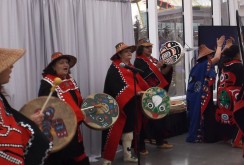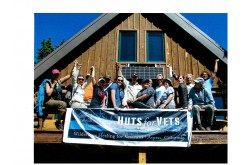
On any given Thursday morning when school is in session at the University of Washington-Tacoma campus, you’ll find Thomas Kuljam up on the third floor of the Tioga Library building. He’ll be sitting at a long table where he’s put out a couple of boxes of doughnuts, and he’ll be shooting the breeze with whoever stops in for a sugar fix. Most of the folks who come by are veterans.
That’s because Kuljam is director of an innovative program specifically designed to serve veterans as they transition from the military to a campus environment and ultimately the civilian world.
The Veterans Incubator for Better Entrepreneurship – better known as VIBE – is already attracting nationwide attention, and no doubt it could and should be duplicated elsewhere. But UW-Tacoma was a natural place for it to take root in the first place. Located just 15 miles from Joint Base Lewis-McChord, which is one of the nation’s largest military bases, the University counts a full 20 percent of its student body as having a connection to the armed forces – including veterans and military dependents.
Recognizing this as a significant asset, campus administration tapped Kuljam to pull together the components that have made the VIBE program a launching pad for entrepreneurs throughout the southern stretch of the Puget Sound region.
Kuljam has the cultural competency to make this happen. He understands – from way back – how uncomfortable it can be to transition from one way of life into another.
He was a little kid living in Thailand – his first pet was a water buffalo – when his mom married an American serviceman who moved them to the United States when his tour of duty was over.
When Kuljam landed in this country as a 7-year-old, he couldn’t speak any English. But as a first generation immigrant, he quickly learned to do whatever it took to get by.
He helped his mom, who took in piecework.
He went to school and learned English.
He found a bike in a dumpster and got himself a newspaper route, wondering how “the other half” lived in all those big houses he pedaled past every day.
Oh – and on the side, Kuljam ran a little business as a juvenile loan shark.
“I was always interested in the economy and how money moves,” he says now, with a chuckle and a matter-of-fact shrug.
After Kuljam graduated from high school, he followed in his stepdad’s footsteps and joined the military, serving on active duty and then in the Air Force reserves for twenty years. While in the reserves, he went to college and got a degree in sociology. But he was still interested in the money business, so he got an internship at a credit union – and launched a 25-year banking career.
Kuljam became adept at helping small and midsize companies grow: “If you want to be a rainmaker, you get involved in commercial banking.”
He liked the idea of helping Main Street and getting to know the community. He liked that the companies he was assisting were employing local guys. He liked the fast pace.
Eventually he went out on his own and became a business consultant.
And then academia came calling.
At VIBE, Kuljam has developed a program that harnesses the skills that veterans have honed in the service – resourcefulness, resilience, self-discipline – to develop viable businesses of their own. But he’s also expanded the mix to team veterans up with other motivated students across campus and with a very supportive business community.
Everyone’s welcome to attend Grit City Mondays, where an Army Green Beret vet gives pointers on mental toughness; or Technical Tuesdays, which feature tools and skills needed in day-to-day business operations. The Wednesday Brown Bag Lunch series lets attendees network with successful entrepreneurs who come in to share practical business knowledge.
This Spring, VIBE is in the throes of its second annual Business Plan Competition, a combination boot camp/contest for entrepreneurial start-up teams, each including at least one member who is a veteran living in Washington State.
At the end of the inaugural competition last year, the top contender was awarded $25,000 in capital and an additional $25,000 of in-kind legal, marketing and mentoring services. Less than a year later, Tart Hard Cider has done over a million dollars in business.
But VIBE also makes a point of supporting social entrepreneurs who are finding innovative ways to build nonprofit organizations that serve unmet needs in veterans’ and other communities.
Tuned in to many frequencies, VIBE is helping the historically blue-collar town of Tacoma roll up its sleeves in a bold new way as entrepreneurial culture plays an essential role in the economic revival of downtown, and in the successful re-entry of veterans into civilian life.
Kuljam has created an unconventional learning space where veterans know they are welcome to come try out ideas, work hard, make mistakes, learn from them, and refine those ideas and try again.
“I tell people that when you become an entrepreneur, you’re gonna sleep like a baby,” Kuljam says, “because you’re gonna wake up screaming every three hours!”
Humor, acceptance, practical support – and don’t forget those doughnuts – all are part of VIBE’s successful formula.
Barbara Lloyd McMichael is now covering stories in South King County and beyond to towns surrounding Tacoma, Olympia, Longview and Vancouver, Washington.











